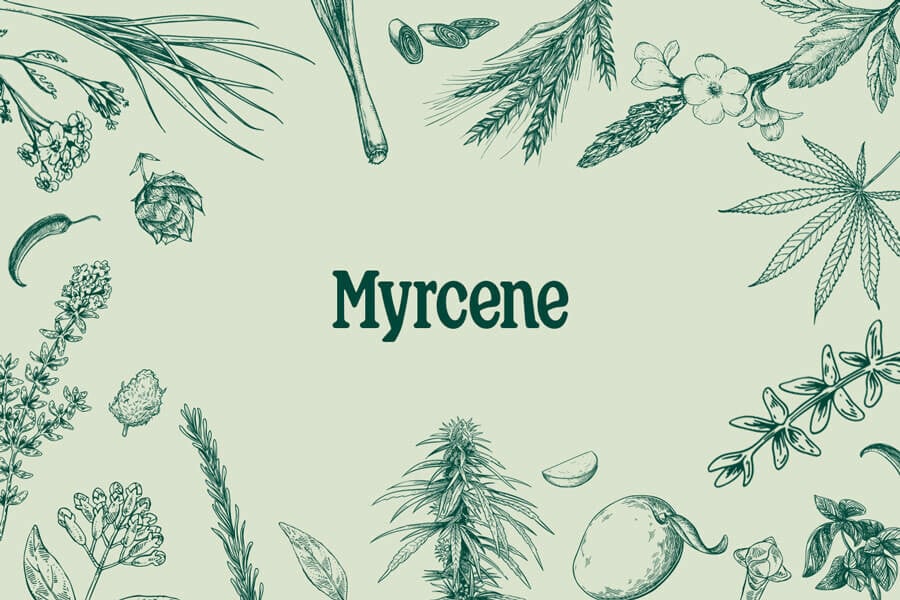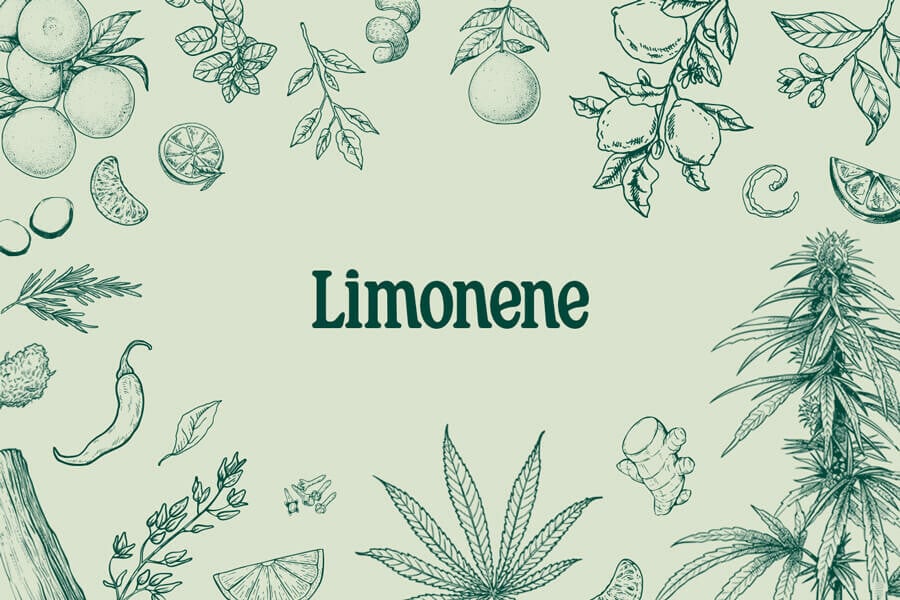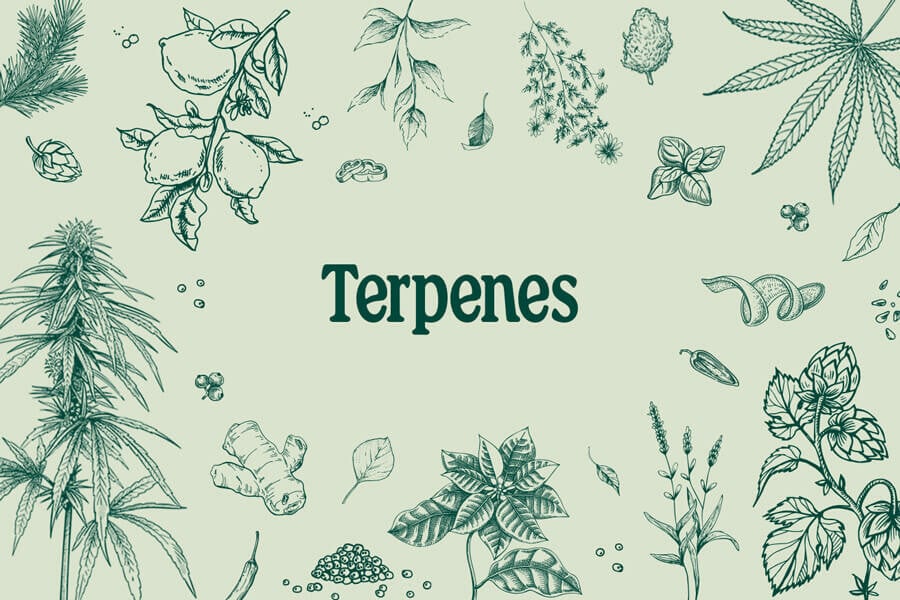.

Cineol (Eucalyptol): A Terpene With Strong Medicinal Potential
Cineol is an aromatic terpene, that is found within numerous strains of cannabis, lending to some beautiful smells. This substance has been studied in impressive depth and has shown anticancer, anti-inflammatory, and antibacterial properties.
Almost every weed smoker and cannabis consumer is aware of the different cannabinoids within the plant, and how they act to offer different highs and varying medicinal properties. But, what if I told you, that there’s far more to cannabis than just cannabinoids? There are whole other families of molecules, that contribute to the diversity in experience, that occurs from strain to strain.
Another major component of cannabis are terpenes, volatile aromatic compounds, that occur all throughout the plant kingdom. Terpenes are responsible for the stunning scents and aromas found within buds. The variation of terpene content can be huge, resulting in strains, that offer completely different sensory experiences.
Strains with more of a mango scent contain more myrcene, whereas those, that smell more like citrus are richer in limonene. These compounds don’t just smell good, but can also alter the psychoactive and medicinal effects of cannabinoids via the entourage effect.
Another terpene found frequently within cannabis is cineol, also known as eucalyptol. This terpene is responsible for the pleasurable and cooling scents found within eucalyptus, mint, rosemary, tea tree, mugwort, bay leaves, sweet basil, sage, and certain strains of cannabis. This organic compound was first identified by Francois Stanislas Cloez in 1870.
The potent, cooling, yet spicy aroma has been used throughout various industries and is often found within cosmetics, lotions, essential oil blends, and balms. Beyond its scent profile, eucalyptol has been studied pretty intensely and has shown to have numerous potential applications within the domain of medicine.
Strains high in the terpene could help to assist medical patients who are experiencing conditions, that the science shows cineol to be effective for.

ALZHEIMER’S DISEASE
Cineol may have a positive effect on Alzheimer’s disease due to its potential to enhance memory and learning. Terpenes are so small that they can easily pass the blood-brain barrier, meaning that they can induce direct effects upon the brain.
Studies have administered cineol during memory testing to see what effects it could catalyse. A 2012 study[1] involving 22 participants tested cineol's effect on mood and memory. Selected participants were exposed to rosemary essential oil, which contains cineol. As these participants were assigned mathematical tasks, rosemary oil was diffused into the testing room in varying quantities.
A positive correlation was seen between the amount of correct answers and higher blood levels of cineol. Therefore, cineol may contribute towards improved cognition, possibly easing some symptoms experienced with the onset of Alzheimer’s disease.
Cineol may also help another element of Alzheimer’s disease. During the condition, beta-amyloid plaque proteins start to accumulate within the brain and block cell-to-cell signalling at synapses. These proteins may also initiate inflammation. Cineol has been reported[2] to decrease the inflammation caused by amyloid beta plaques.

ANTIBACTERIAL
Cineol research[3] has revealed the molecule to be effective against certain strains of bacteria, including Escherichia coli, Enterobacter aerogenes, Serratia marcescens, and Staphylococcus aureus, showing its potency as an antibacterial.
Staphylococcus aureus is a type of bacteria, that is resistant to certain conventional antibiotic drugs. The bacteria can contribute towards numerous conditions associated with it, including impetigo, skin abscesses, wound infections, and folliculitis. The potential of cineol as an antibacterial may mean it is one day recruited as a form of medication to combat and prevent such infections within the body.
ANTIOXIDANT
Antioxidant compounds have become very popular within the health and fitness industries. Antioxidants act to neutralise free radicals within the system, preventing them from inflicting DNA damage through oxidation.
A theory surrounding antioxidants suggests, that increased intake may protect against the development of cancer. Antioxidants are also associated with slowing down the ageing process and preventing heart disease and stroke.
Cineol has been proven[4] to act as an antioxidant and may therefore offer these benefits. A 2011 study published within the journal Toxicology and Industrial Health administered cineol to rats who were exposed to a persistent environmental pollutant. The researchers concluded, that cineol displayed antioxidant activity and eliminated oxidative stress within the rats in a time-dependant manner.

ANTICANCER
Perhaps the most profound aspect of cineol is the molecule’s anticancer action. A 2002 paper[5] published within Oncology Reports details an investigation in which cineol was administered to human leukaemia cell lines. The researchers found, that cineol suppressed the growth of the leukaemia cell lines due to inducing apoptosis.
Apoptosis is described as programmed cell death and is required in the body to maintain normal cell turnover and proper function of the immune system. Too little or too much apoptosis can be the cause of numerous health conditions, including many types of cancers, which are the result of cell mutation. The ability of cineol to suppress cancer cell line growth and to induce apoptosis makes it a potential future therapeutic within the domain of cancer treatments.
ASTHMA
Cineol may also serve as an effective therapeutic when it comes to asthma. Asthma is a common inflammatory disease, that affects the airways of the lungs. Symptoms can include coughing, chest tightness, shortness of breath, and wheezing. Asthma triggers include allergens, irritants, exercise, and chest infections.
A 2012 paper[6] published within the Journal of Asthma showed that cineole can result in improvement in lung function and health, and can reduce dyspnea in asthma patients.
- Effects of Rosemary Essential Oil on Mood and Memory | NHRI http://www.naturalhealthresearch.org
- 1,8-Cineole (Eucalyptol) Mitigates Inflammation in Amyloid Beta Toxicated PC12 Cells: Relevance to Alzheimer’s Disease | SpringerLink https://link.springer.com
- Essential oil variation in the populations of Artemisia spicigera from northwest of Iran: Chemical composition and antibacterial activity http://www.tandfonline.com
- SAGE Journals: Your gateway to world-class journal research http://journals.sagepub.com
- Antitumor effect of 1, 8-cineole against colon cancer https://www.spandidos-publications.com
- Patients with Asthma Benefit from Concomitant Therapy with Cineole: A Placebo-Controlled, Double-Blind Trial http://www.tandfonline.com





































